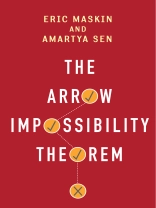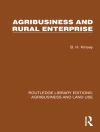Kenneth J. Arrow’s pathbreaking ‘impossibility theorem’ was a watershed innovation in the history of welfare economics, voting theory, and collective choice, demonstrating that there is no voting rule that satisfies the four desirable axioms of decisiveness, consensus, nondictatorship, and independence.
In this book Eric Maskin and Amartya Sen explore the implications of Arrow’s theorem. Sen considers its ongoing utility, exploring the theorem’s value and limitations in relation to recent research on social reasoning, and Maskin discusses how to design a voting rule that gets us closer to the ideal—given the impossibility of achieving the ideal. The volume also contains a contextual introduction by social choice scholar Prasanta K. Pattanaik and commentaries from Joseph E. Stiglitz and Kenneth J. Arrow himself, as well as essays by Maskin, Dasgupta, and Sen outlining the mathematical proof and framework behind their assertions.
表中的内容
Acknowledgments
Introduction, by Prasanta K. Pattanaik
Part 1: The Lectures
Opening Remarks, by Joseph E. Stiglitz
Arrow and the Impossibility Theorem, by Amartya Sen
The Arrow Impossibility Theorem: Where Do We Go From Here?, by Eric Maskin
Commentary, by Kenneth J. Arrow
Part II: Supplemental Materials
The Informational Basis of Social Choice, by Amartya Sen
On The Robustness of Majority Rule, by Partha Dasgupta and Eric Maskin
The Origins of the Impossibility Theorem, by Kenneth J. Arrow
Notes on Contributors
关于作者
Professor Dasgupta is the Frank Ramsey Professor of Economics at the University of Cambridge. He is also the Andrew D. White Professor-at-Large at Cornell University and is currently President of the European Association of Environmental and Resource Economists. His books include Economics: A Very Short Introduction (OUP, 2017), Human Well-Being and the Natural Environment (OUP, 2004) and An Inquiry into Well-Being and Destitution(OUP, 1993).












